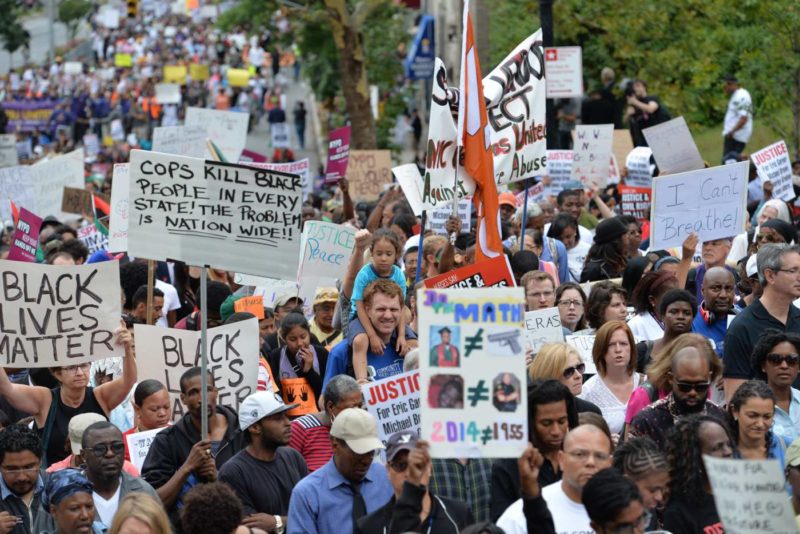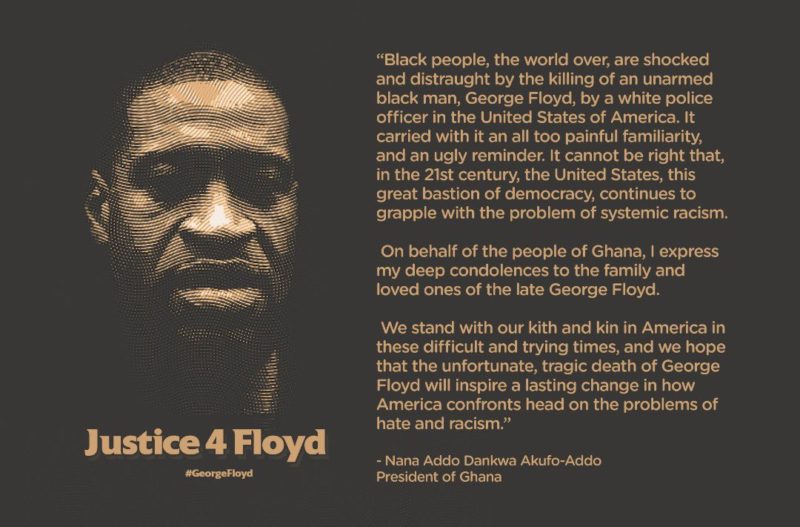Special News Series: Rising Up For Justice! – Ghana’s message to African Americans is “Come home”
Share
Explore Our Galleries
Breaking News!
Today's news and culture by Black and other reporters in the Black and mainstream media.
Ways to Support ABHM?
Introduction To This Series:
This post is one installment in an ongoing news series: a “living history” of the current national and international uprising for justice.
Today’s movement descends directly from the many earlier civil rights struggles against repeated injustices and race-based violence, including the killing of unarmed Black people. The posts in this series serve as a timeline of the uprising that began on May 26, 2020, the day after a Minneapolis police officer killed an unarmed Black man, George Floyd, by kneeling on his neck. The viral video of Floyd’s torturous suffocation brought unprecedented national awareness to the ongoing demand to truly make Black Lives Matter in this country.
The posts in this series focus on stories of the particular killings that have spurred the current uprising and on the protests taking place around the USA and across the globe. Sadly, thousands of people have lost their lives to systemic racial, gender, sexuality, judicial, and economic injustice. The few whose names are listed here represent the countless others lost before and since. Likewise, we can report but a few of the countless demonstrations for justice now taking place in our major cities, small towns, and suburbs.

To view the entire series of Rising Up for Justice! posts, insert “rising up” in the search bar above.
After George Floyd, Ghana’s simple message to African Americans: “Come home”
By Kwasi Gyamfi Asiedu, Quartz Africa
June 20, 2020

Day one of a long march that hopes to end in Washington, D.C., started a
As a series of protests and events to mark the life of George Floyd began in Minneapolis earlier this month, a memorial was being held 10,000 kilometers away in Ghana’s capital, Accra.
Attended by government representatives and a small socially-distanced group of African Americans living in Ghana, the memorial was held in solidarity with the Black Lives Matter movement and Floyd, who died on May 25 after a white police officer knelt on his neck for nearly nine minutes during an arrest.
Ghana has long courted the descendants of enslaved Africans to “return home” as tourists or to permanently resettle. Leading African American icons including Martin Luther King Jr, Maya Angelou, Muhammad Ali, and Malcolm X have either visited or lived in the country since independence in 1957.
With large-scale protests across the United States and Europe taking place, many hope the organic groundswell of anger with racial injustice would be a tipping point in race relations. Ghana’s government, meanwhile, is hoping to tap into the current mood of reflection and resistance to strengthen its pitch targeting people of African descent in the diaspora.
At the memorial and wreath-laying ceremony for Floyd, the minister of tourism, Barbara Oteng-Gyasi, re-echoed the government’s message to African Americans to “Come home.”
“We continue to open our arms and invite all our brothers and sisters home. Ghana is your home. Africa is your home. We have our arms wide open, ready to welcome you home,” she said. “Please take advantage. Come home, build a life in Ghana. You have a choice and Africa is waiting for you,” she added at the event held at a center dedicated to another prominent African American, the pan-African sociologist W.E.B Du Bois, who lived his later years in Ghana and is buried at the center.

Even before the memorial, Ghana’s president, Nana Akufo-Addo, had condemned Floyd’s killing and called for justice. “We stand with our kith and kin in America in these difficult and trying times, and we hope that the unfortunate, tragic death of George Floyd will inspire a lasting change in how America confronts head on the problems of hate and racism,” he said in a statement.
The overtures by the government have been noticed by Floyd’s family who, during his globally televised funeral in Houston, thanked Ghana for unveiling a plaque in his honor at the Du Bois Center. “The family is deeply moved by the generous act of the Ghanaian government to solidify George Floyd’s legacy,” an announcer said after a standing ovation.
The government declared 2019 as the “Year of Return,” to commemorate 400 years since the anchoring of an English ship in Jamestown, Virginia carrying a small group of enslaved Africans. The Congressional Black Caucus, rapper Ludacris, television presenter Steve Harvey, and the prime minister of Barbados, Mia Mottley, were some of the high profile visitors that traveled to the country last year as part of the Year of Return’s activities.
Read the full article here.









Comments Are Welcome
Note: We moderate submissions in order to create a space for meaningful dialogue, a space where museum visitors – adults and youth –– can exchange informed, thoughtful, and relevant comments that add value to our exhibits.
Racial slurs, personal attacks, obscenity, profanity, and SHOUTING do not meet the above standard. Such comments are posted in the exhibit Hateful Speech. Commercial promotions, impersonations, and incoherent comments likewise fail to meet our goals, so will not be posted. Submissions longer than 120 words will be shortened.
See our full Comments Policy here.